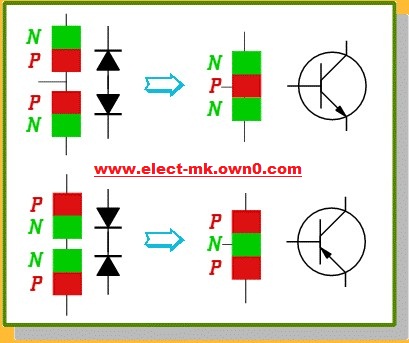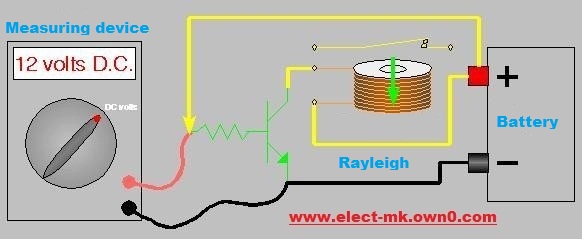amr mohamed





Occupation: : 369
Date of Birth : 1994-09-29
Join Date : 2010-11-12
Age : 30
 |  Subject: Transistor Subject: Transistor  Wed 16 Mar 2011, 8:23 am Wed 16 Mar 2011, 8:23 am | |
| TransistorWhat is the transistor
Transistor (Transistor) is a piece with three legs to hide them every man a different type of
Semiconductor material, although two of them were similar but different
Two transistors are PNP and NPN
From the right represents the type (PNP) Note the direction of the arrow, and the second represents the type (NPN) the most
Famous and widely used.
Transistor has three parties are the norm, and B complex C and the emitter E.
The three materials manufactured as follows in the transistor (BJT NPN):
1 - Al Qaeda (base):
It is a carbon material mixed material boron, as
Carbon contains four electrons in the valence shell, while boron Ihori three, which makes
They relate to molecular loosely so that the lack of a single electron in an atom of boron allows the existence of
Electron gap waiting to settle it symbolizes the link of this type of semiconductor b
(P), and this Mmaidjal this article is connected to poor electricity where the conductivity is equal to 1 compared to
Copper which is 10 ^ 12.
This rule occupies the bulk of the transistor, as the equivalent of twice the size of both
The other two parties so that they are floating and which separates between the surface of each distance in microns.
2 - Whole or compound (Collector):
It is a carbon material also with arsenic bearing
Five electrons in the valence
Which makes the molecular structure with an electron plus the development of stability does not mean this as a negative
It is neutral because the article did not lose anything or gain of electrons and a symbol for this type b
(N).
3 - or radioactive emitter (Emitter):
And has the same structure in terms of having the same items, but here is different in
Increase the density of arsenic significantly and the reason for this will be seen recently.
What is the work of the transistor?
Is a current generator controlled by the effort by (Voltage Controlled Current Source).
Question how to do it???
I mean that it is a device that generates a stream in a part of the Department of severity depending on the effort in part
Last of the circle,

The answer is that when you connect the radioactive compound in a circle while reaching base in voltage in
Other department, we find that the effort is given to the base controls the trend passing through the radioactive compound
In the second condition and the delivery of the radioactive compound for this type of transistor
Is such that the effort at the complex is higher than the voltage at the base and both higher voltage
Followed by radioactive and this is what they call (Active Mode) and the transistor will not work unless this function
Will the so-called function (Switching) is used in digital circuits.
After all when you connect the transistors in the manner that it becomes between the base and a radioactive
Diode for a normal situation in front and between the base and the complex situation in a normal diode
Reverse, but when you plug the base circle to withdraw electrons from the radiator to be higher
When the effort to enter the compound to the base as the top most of the effort to withdraw
Electrons to it and what comes out of the party base but is very simple stream of electrons
When you change the rule change speed effort in rule to withdraw electrons to change their minds so
Current passing between the radioactive compound.
Transistor currents:
Currents came the most important in the transistor are the base current IB and the tide of the complex IC,
The first trend is the current Governor, where controls the current second. Meaning that the more
Stream increased stream base complex to a certain point called saturation, which does not increase
After the compound stream, up stream of the base.
.
، When you close the key stream will pass a small base of the battery
Transistor, this current is sufficient to light LED lighting LED B dim dim. The
Transistor then maximize this current trend for small to allow a much larger stream
Passage of the compound to the radiator (emitter) (of course, is to pass from the battery to the resistance 470
Aum to the complex to the emitter to the negative battery). This trend makes the great value
LED C shines a powerful light.
When you open the key, the current rule does not pass transistor becomes OFF Mntvi not pass stream
Complex and it also does not light up any LED. Stream of the ruling al-Qaeda is usually very small compared to stream complex, and this current small
Controlled stream of large complex.
 | |
|




